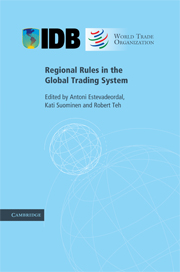Book contents
- Frontmatter
- Contents
- List of figures
- List of tables
- List of Contributors
- Foreword
- Acknowledgements
- List of abbreviations
- 1 Introduction
- 2 Big-Think Regionalism: a critical survey
- 3 Market access provisions in regional trade agreements
- 4 Trade remedy provisions in regional trade agreements
- 5 A mapping of regional rules on technical barriers to trade
- 6 Services liberalization in the new generation of preferential trade agreements: how much further than the GATS?
- 7 Mapping investment provisions in regional trade agreements: towards an international investment regime?
- 8 Competition provisions in regional trade agreements
- Appendix: List of RTAs included in the survey
- Index
8 - Competition provisions in regional trade agreements
Published online by Cambridge University Press: 01 March 2011
- Frontmatter
- Contents
- List of figures
- List of tables
- List of Contributors
- Foreword
- Acknowledgements
- List of abbreviations
- 1 Introduction
- 2 Big-Think Regionalism: a critical survey
- 3 Market access provisions in regional trade agreements
- 4 Trade remedy provisions in regional trade agreements
- 5 A mapping of regional rules on technical barriers to trade
- 6 Services liberalization in the new generation of preferential trade agreements: how much further than the GATS?
- 7 Mapping investment provisions in regional trade agreements: towards an international investment regime?
- 8 Competition provisions in regional trade agreements
- Appendix: List of RTAs included in the survey
- Index
Summary
Introduction
This paper maps and examines competition-related provisions in seventy-four regional trade agreements (RTAs). The template used for the mapping is based on previous work done to map competition-related provisions in RTAs and on recent thoughtful critiques of those approaches. The mapping undertaken in this paper applies to all competition-related provisions of the RTAs and not just to the competition policy chapter. This distinction is important because there are salient competition provisions in the other chapters of regional trade agreements which affect the conditions of competition among suppliers, undertakings and enterprises that operate in the markets of RTA members.
There has been a recent flurry of research on competition provisions in RTAs. In the past few years, the United Nations Economic Commission for Latin America and the Caribbean (Silva 2004), UNCTAD (Brusick, Alvarez and Cernat 2005) and the OECD (Solano and Sennekamp 2006) have analyzed competition policy provisions in RTAs. Of particular interest is the OECD study which conducts a mapping of the competition policy chapters in eighty-six RTAs. While acknowledging the contribution of the OECD study in bringing to light many salient features of competition provisions in these trade agreements, Anderson and Evenett (2006) have also critiqued the approach taken in the OECD mapping of focusing solely on the competition policy chapters of the agreements and neglecting the sector-specific provisions and horizontal competition principles which are, in their view, equally important.
- Type
- Chapter
- Information
- Regional Rules in the Global Trading System , pp. 418 - 491Publisher: Cambridge University PressPrint publication year: 2009
- 2
- Cited by

